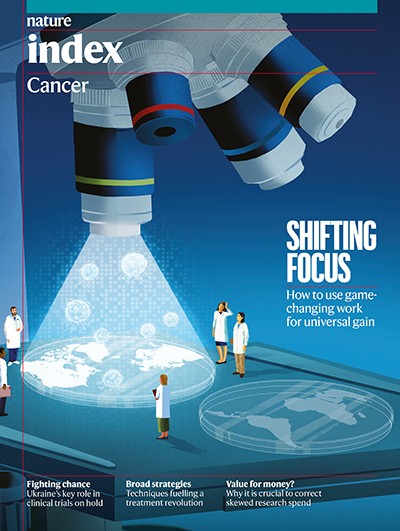Illustration: Eva Vázquez
There is a stark mismatch when it comes to cancer-research investment in high-income nations and the needs of low- and middle-income countries, which bear the brunt of the millions of cancer-related deaths that occur each year. One study published in June states that just 4.2% of the US$24.5 billion in public and philanthropic grants for cancer research went to surgery and radiotherapy research in 2016–20, despite estimates from 2015 that 80% of new cancer cases worldwide require surgery, and up to 50% require radiotherapy (S. A. McIntosh et al. Lancet Oncol. 24, 636–645; 2023). By contrast, almost 20% of funding during this period was spent on drug-treatment research, which has historically conferred only modest improvements on patients. Even the most promising new treatments, including those discussed in this supplement, might be decades away from having a meaningful impact.

Nature Index 2023 Cancer
This suggests that global cancer research is in need of a reset, one that accounts for the capacity-building that is needed in parts of the world that are facing unprecedented challenges. Sub-Saharan Africa, for instance, expects to see cancer deaths double this decade. But many African researchers and health-care workers deal not only with a scarcity of facilities and tools, but also a lack of proper data collection. Elsewhere, conflict is threatening hard-won progress. Before the Russian invasion, Ukraine was a key site for cancer clinical trials, which not only provide a lifeline for patients, but have supported a flourishing medical industry that now faces isolation.
Cancer research, of course, has immense value, underlined by a fall in cancer mortality rates in high-income countries. But allowing such inequalities in cancer science and health care to widen risks blunting the potential of research to save lives.
This article is part of Nature Index 2023 Cancer, an editorially independent supplement. Advertisers have no influence over the content.